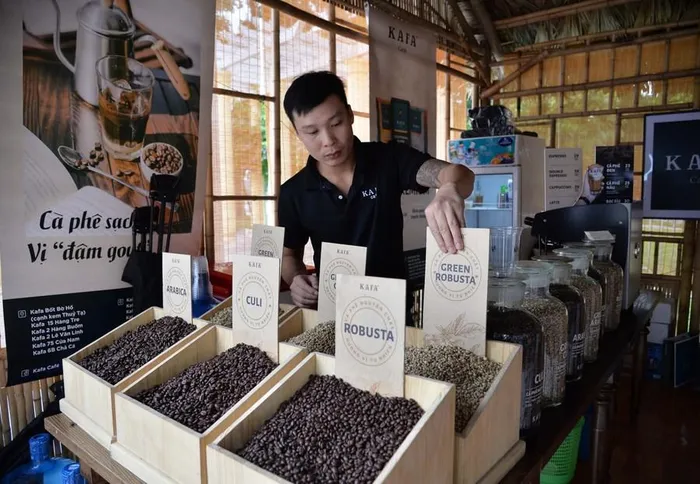
A stall displays varieties of Vietnamese coffee beans during the Hanoi Gastronomy Festival in Hanoi, capital city of Vietnam.
Image: XINHUA
Vietnam’s coffee industry is set to benefit from a surge in global coffee prices, presenting an opportunity to expand its share in international markets. According to a recent report by the Food and Agriculture Organisation of the United Nations, coffee prices worldwide rose by roughly 40 percent in 2024, largely driven by adverse weather linked to climate change. Reduced output in Brazil, Colombia, and Indonesia coincided with rising demand across Europe, the United States, and Asia.
Vietnam recorded a coffee export turnover exceeding $560 million in July, bringing the total for the first seven months of 2025 to $3.6 billion, a 20 percent increase compared to the same period last year, according to the Ministry of Agriculture and Environment. This growth is attributed mainly to higher global coffee prices.
As the world’s largest exporter of Robusta coffee, accounting for around 40 percent of the global market, Vietnam is now seeking to capitalise on favourable conditions to increase its market share. Nguyen Nam Hai, president of the Vietnam Coffee and Cocoa Association (Vicofa), emphasised that the international coffee market has not been this advantageous in years. Stable supply, combined with rising demand and prices, positions Vietnam well for growth.
Despite the opportunities, the sector faces structural challenges. To fully leverage the current market environment, Vietnam must move beyond raw bean exports and invest in value-added processing, including roasted, instant, and specialty coffee. Currently, deep-processed products account for just 12–15 percent of Vietnam’s total coffee exports, compared with 30–40 percent in countries like Brazil and Colombia.
Industry experts note that initial investments in advanced processing technologies, particularly for instant coffee, require substantial capital, which many businesses may struggle to afford. Technological constraints and branding challenges have also slowed the transition toward higher-value products. Le Hoang Diep Thao, founder and CEO of TNI King Coffee, stressed that investment in deep processing can significantly enhance product value.
Globally, coffee growers face mounting pressure from climate change, with suitable cultivation areas projected to shrink sharply by mid-century. Rising temperatures, erratic rainfall, and increased frequency of droughts and floods threaten production in major coffee-growing regions, including Brazil, Vietnam, Colombia, and Ethiopia. Experts also highlight ageing farmer populations, migration, and labour shortages as additional risks to long-term sustainability.
Agricultural economists argue that without strategic investment in processing and stronger branding efforts, Vietnam risks remaining a supplier of raw materials rather than a global coffee powerhouse. By developing a long-term strategy to enhance product value and elevate the national brand, the country can better secure its position in the competitive international coffee market.
Written By:
*Dr Iqbal Survé
Past chairman of the BRICS Business Council and co-chairman of the BRICS Media Forum and the BRNN
*Cole Jackson
Lead Associate at BRICS+ Consulting Group
Chinese & Middle Eastern Specialist
** MORE ARTICLES ON OUR WEBSITE https://bricscg.com/
** Follow https://x.com/brics_daily on X/Twitter for daily BRICS+ updates
Related Topics: